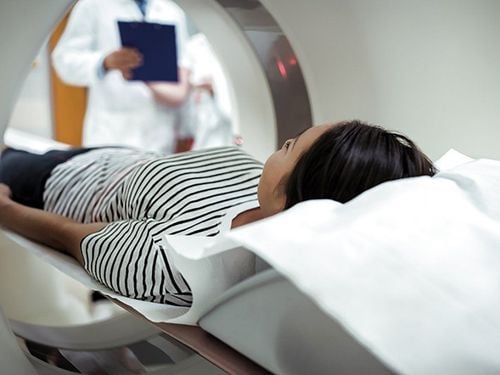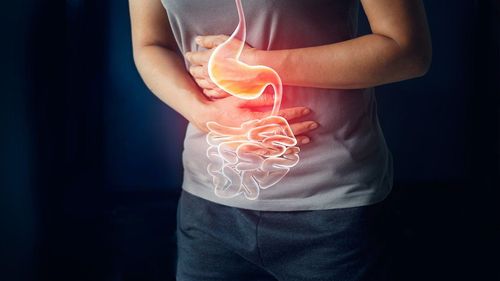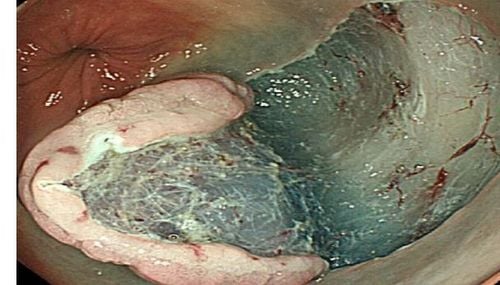This is an automatically translated article.
Stomach cancer is a fairly common disease today. The disease can progress silently for many years and is only diagnosed when it is very advanced. Therefore, patients need to pay attention to the signs suggestive of stomach cancer for timely diagnosis and treatment.
1. What is stomach cancer?
Stomach cancer, also known as stomach cancer, occurs when healthy cells in your stomach change and grow out of control. This condition tends to slowly get worse over many years. It can start in any part of the stomach and can spread to other areas of the body, including the liver, lungs, and bones.
Adenocarcinoma is the most common type, accounting for up to 95% of all cases. It begins in the tissues of the stomach lining, in the cells that make mucus and other fluids. Less common types of stomach cancer include those that start in the cells of the gastrointestinal tract and lymphomas (involving lymph nodes).
Approximately 28,000 people develop stomach cancer each year in the United States, and 60% of patients diagnosed with the disease are over the age of 65. Men are at a higher risk than women. Stomach cancer was the leading cause of cancer death in the United States until the 1930s, but it's now the 14th most common cancer. Researchers say stomach cancer could be has become less popular due to the introduction of refrigerators that help preserve food better.
2. Risk factors that can lead to stomach cancer
Helicobacter pylori This is a bacteria that causes ulcers, gastritis and is one of the main causes of cancer. There are many different strains of H.pylori bacteria, some with a higher risk of causing cancer. Your doctor can test you to see if you have this type of bacteria. H. pylori infection can be treated with antibiotics, which could be another reason stomach cancer is less common today than it was in the 1930s. If you have a parent, sibling or If your child is diagnosed with stomach cancer, you should get tested for H.pylori bacteria.
Medical history You are more likely to get stomach cancer if someone in your family has had the disease or you have had stomach surgery. Certain medical conditions can also increase the risk of stomach cancer such as pernicious anemia, familial adenomatous polyposis (having polyps in areas such as the stomach and colon), achlorhydria (not having enough of one). certain acids in the digestive juices).
Unhealthy lifestyle Lifestyle can affect your chances of getting stomach cancer. Eating a lot of smoked foods, fish and salted meats, and pickled vegetables can increase the risk of disease, along with not eating enough fruits and vegetables. You may also be more likely to get it if you smoke, drink a lot of alcohol, or are obese.

Bệnh ung thư bao tử xảy ra khi các tế bào khỏe mạnh trong dạ dày của bạn thay đổi
3. What are the signs of stomach cancer?
When you have stomach cancer, you may not notice any unusual symptoms. Sometimes the disease is not discovered until it has spread to another part of the body. Some signs suggesting stomach cancer include:
Fatigue; Feeling bloated or full after eating even a little; Ợ sour and indigestion; Nausea and vomiting; Diarrhea or constipation; Stomachache; Unexplained weight loss; Not feeling hungry; Bloody or black stools.
4. How is stomach cancer diagnosed?
Your doctor will ask about your medical history, lifestyle, and any unusual symptoms. If your doctor thinks you may have stomach cancer, he or she will advise you to see a gastroenterologist for in-depth tests.
To diagnose stomach cancer, doctors often prescribe endoscopy. A small camera is inserted down the throat to look at the patient's stomach. If anything is abnormal, doctors will take a small tissue sample called a biopsy and send it to a lab.
At the lab, technicians will look for cancer cells and look at stomach cancer under the microscope. Your doctor may recommend other tests to evaluate the tumor more closely. You may be ordered to have a CT (computerized tomography) scan or an MRI (magnetic resonance) scan to aid in the diagnosis of stomach cancer.
5. Treatment of stomach cancer
5.1 Surgery for stomach cancer Treatment will depend on the location of the tumor, how advanced it is, and the patient's overall health. In most cases, surgery to remove the tumor is the first step in treatment. The doctor may also remove part or all of a patient's stomach or take lymph nodes from other parts of the body to look for signs that the cancer has spread.
5.2. Radiation and chemotherapy Patients may be prescribed radiation or chemotherapy to shrink the tumor before surgery and possibly after surgery to remove any remaining cancer cells. These two types of therapy are often used together.
5.3. Other therapies Your doctor may suggest targeted therapy - drugs that specifically find and attack cancer cells without harming surrounding healthy cells. Your doctor may also recommend immunotherapy, which helps your body use its natural defenses to fight cancer.

Tích cực tập luyện thể dục là cách chủ động phòng ung thư dạ dày
6. Measures to prevent stomach cancer
To prevent stomach cancer, each individual needs to:
Maintain an ideal weight; Actively exercising is an active way to prevent stomach cancer; Avoid the use of alcohol, beer and stimulants; Limit smoked, pickled foods; Using foods that meet hygiene and food safety standards; Eat lots of fruits and vegetables; When there are signs of pain, gastritis or suspected H.pylori infection, it is necessary to go to the hospital for examination and thorough treatment; Testing for screening and treatment of stomach diseases such as polyps, benign tumors; Routine cancer screening. Stomach cancer is a dangerous disease with a high mortality rate. Therefore, when detecting abnormal digestive symptoms, you need to immediately go to medical facilities for examination, to avoid the disease developing to a severe stage, which will be very difficult to treat.
Gastrointestinal cancer screening is a scientific and effective measure for early detection of gastrointestinal cancers (esophageal cancer, stomach cancer, colon cancer) and providing a good treatment plan. best. Currently, Vinmec International General Hospital has a package of screening and early detection of cancers of the gastrointestinal tract (esophagus - stomach - colon) combined with clinical and paraclinical examination to bring the most accurate results. maybe.
When screening for gastrointestinal cancer at Vinmec, you will receive:
Gastrointestinal specialty examination with an oncologist (by appointment). Gastroscopy and colonoscopy with an NBI endoscope with anesthesia. Peripheral blood count (laser counter). Automated prothrombin time test. Automated thrombin time test. Activated Partial Thromboplastin Time (APTT) test using an automated machine. General abdominal ultrasound.
Please dial HOTLINE for more information or register for an appointment HERE. Download MyVinmec app to make appointments faster and to manage your bookings easily.
Reference source: webmd.com












